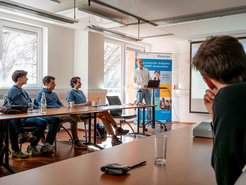What does a consultant actually do?
Insights into the work at Basycon

“Superficial”, “80-hour week” or “just business people” – these prejudices persist when it comes to working in a consulting firm.
Yesterday, our doctoral candidates learned that this does not have to be the case during a visit to Basycon. The consultancy specializes in IT-related consulting and places particular emphasis on employees with a scientific background.
Stefan Wilke and his colleagues Annika Lieb and Jim Skulte gave us a comprehensive insight into the work at the company. Starting with a general overview of the world of consulting, they presented the specific fields of activity at Basycon and shared examples and experiences from their day-to-day work.
It became clear: Consulting is multifaceted – and depending on the orientation of the company, the way of working is completely different. While some companies do have a business focus, consultancies with a STEM focus such as Basycon require an analytical approach and a critical and constructive way of thinking. These are skills that are mainly learned during doctoral studies. The only difference lies in the application of these skills: Instead of dealing with scientific problems, you deal with your client’s problems.
And these problems can be very diverse. Familiarizing yourself with new topics is part of everyday life. “You don't know everything, but you learn quickly!” Stefan Wilke encouraged the doctoral students. He himself joined Basycon over 20 years ago after completing his doctorate in theoretical physics.
Thank you for this interesting insight away from the usual clichés!
Photos: Nina Beier




